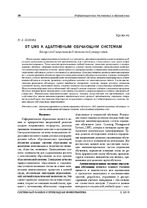| dc.contributor.author | Попова, Ю. Б. | |
| dc.coverage.spatial | Минск | ru |
| dc.date.accessioned | 2019-08-28T09:23:39Z | |
| dc.date.available | 2019-08-28T09:23:39Z | |
| dc.date.issued | 2019 | |
| dc.identifier.citation | Попова, Ю. Б. От LMS к адаптивным обучающим системам = From LMS to adaptive training systems / Ю. Б. Попова // Системный анализ и прикладная информатика. – 2019. – № 2. – С. 58-64. | ru |
| dc.identifier.uri | https://rep.bntu.by/handle/data/56581 | |
| dc.description.abstract | Использование информационных технологий и, в частности, автоматизированных систем управления обучением, увеличивает возможности как преподавателя, так и обучаемого, в достижении своих целей в образовательном процессе. Такие системы предоставляют учебный контент, помогают организовать и контролировать обучение, собирают статистику прогресса, а также могут учитывать индивидуальные особенности каждого пользователя системы. Целью данного исследования является определение направления развития современных обучающих систем и технологий их реализации. Была рассмотрена эволюция автоматизированных систем управления обучением, переход к интеллектуальным обучающим системам, основные этапы работы таких систем, проанализированы виды последовательностей обучения, выявлена трансформация в адаптивные обучающие системы, приведена схема работы системы и ее математическая модель. В качестве механизмов реализации обучающих систем определены экспертные системы, теория нечетких множеств и нечеткой логики, кластерный анализ, а также генетические алгоритмы и искусственные нейронные сети. Искусственная нейронная сеть в адаптивной обучающей системе позволит создавать уникальную программу обучения, которая будет отталкиваться от имеющихся знаний и уровня восприятия учебного материала обучающимся. Формализовав интеллектуальные процессы, которые осуществляют как преподаватель, так и обучающийся, можно автоматизировать определенную часть функций преподавателя, сократить затраты на ручной труд, что позволит более просто осуществлять контроль за учебным процессом, а также сделать процесс обучения более эффективным. | ru |
| dc.language.iso | ru | ru |
| dc.publisher | БНТУ | ru |
| dc.title | От LMS к адаптивным обучающим системам | ru |
| dc.title.alternative | From LMS to adaptive training systems | ru |
| dc.type | Article | ru |
| local.description.annotation | The use of information technology and, in particular, learning management systems, increases the ability of both the teacher and the learner to achieve their goals in the educational process. Such systems provide educational content, help organize and monitor training, collect progress statistics, and can also take into account the individual characteristics of each user of the system. The purpose of this study is to determine the direction of development of modern learning systems and technologies for their implementation. The evolution of learning management systems, the transition to intelligent learning systems, the main stages of such systems were reviewed, the types of learning sequences were analyzed, the transformation into adaptive learning systems was identified, and the scheme of the system and its mathematical model were presented. Expertise systems, the theory of fuzzy sets and fuzzy logic, cluster analysis, as well as genetic algorithms and artificial neural networks are defined as the mechanisms for implementing the learning systems. An artificial neural network in an adaptive learning system will allow you to create a unique training program that will build on existing knowledge and the level of perception of educational material by students. By formalizing the intellectual processes that both the teacher and the student carry out, it is possible to automate a certain part of the teacher’s functions, reduce the cost of manual labor, which will make it easier to monitor the learning process and also make the learning process more efficient. | ru |

